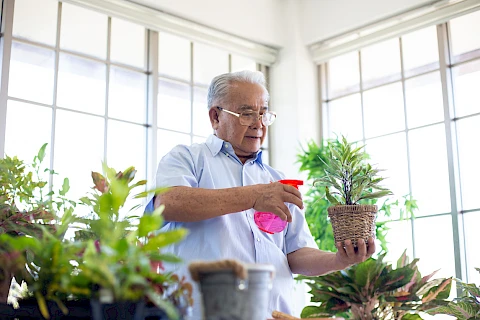
Indoor gardening is a wonderful pastime that brings seniors the joy of nature in the comfort of their homes. It involves growing plants indoors, whether on a windowsill or in containers, or using hydroponics. Engaging in therapeutic activities is part of maintaining seniors' mental and physical health. Indoor gardening offers a rewarding way to stay active, reduce stress, and boost mood.
Benefits of Indoor Gardening for Seniors
Gardening can have a profound impact on seniors' mental well-being. Tending to plants can be a calming activity that helps lower seniors' stress levels and leads to improved mood and emotional well-being. Working with plants can also stimulate the mind through planning and problem-solving, which benefits cognitive health.
Gardening is not just good for the mind; it also offers physical benefits. It involves movements like reaching, bending, and digging, which can provide gentle exercise. Handling small tools and plants can also enhance seniors' motor skills and hand-eye coordination. Lastly, indoor plants can improve air quality by producing oxygen and removing toxins, enhancing seniors' respiratory health.
Setting Up an Indoor Garden
The first step in indoor gardening for seniors is choosing the best location. Most plants need good lighting to thrive, so choose a sunny windowsill or a spot with plenty of indirect light. If the seniors have mobility issues, ensure the plants are easy to reach without bending or stretching too much.
Choosing the right plants can also make a big difference. Consider low-maintenance plants like succulents, pothos, or spider plants. Plants with therapeutic benefits, such as lavender and aloe vera, look good and offer health benefits like stress relief and air purification.
Tips for Maintaining an Indoor Garden
Proper watering and feeding are necessary for plant health. Check the soil before watering and ensure it's dry to the touch to avoid overwatering. Use a balanced fertilizer to keep plants healthy, but be mindful not to overfeed.
Indoor plants can sometimes attract pests, but there are natural ways to manage them. Use soapy water or neem oil to treat common pests like aphids. Look for yellowing leaves, holes, or sticky residue on plants as signs of common pests. Remove dead or yellowing leaves to encourage new growth and turn plants occasionally to ensure even growth and prevent leaning.
Involving Seniors in the Gardening Process
Breaking tasks into manageable steps makes indoor gardening more enjoyable for seniors. Clearly explain each step, like planting seeds or watering, and allow seniors to choose tasks they are most comfortable with to ensure they stay involved and engaged.
Making gardening a regular activity can enhance its benefits. Choose specific days and times for gardening tasks, making it a part of seniors' routines. Gardening can also be a social activity, so invite friends or family to join, making it an opportunity for connection.
Let Senior Helpers Assist You With Your Daily Activities
Indoor gardening offers numerous benefits for seniors, from improving mental and physical health to providing a sense of accomplishment. By choosing the right space, plants, and tools, and maintaining a consistent routine, indoor gardening can be a delightful and therapeutic activity.
We encourage you to start an indoor garden today and experience the joys it can bring. For more support, contact us at Senior Helpers Stafford, serving Fredericksburg, Stafford, Locust Grove, Spotsylvania, and Bealeton areas.